6 Ways AI Can Boost Help Desk Productivity (+ 7 Best AI Help Desk Software in 2025)

Table of contents
Probably the single most important change that has occurred in the way businesses function in recent years has been the adoption of AI.
According to Hiver’s report on The Future of Customer Service in 2024, 43% of organizations are already using or intend to use AI to improve customer service. And in fact, in line with our understanding, 60% of organizations have already seen the benefits AI has to offer by increasing productivity and efficiency of support teams.
As you can see, many support leaders have already recognized the potential AI has to not just improve the way their teams work but also how much smoother and more helpful they can make things for their customers.
That’s why investing in an AI helpdesk becomes important.
Keep reading if you want to learn about –
- What is an AI help desk
- How can AI boost help desk productivity
- 7 best AI help desk solutions available in 2025
Table of Contents
- What is an AI Help Desk?
- 6 Ways AI Can Boost Help Desk Productivity
- A Quick Rundown of the 7 Best AI Help Desk in 2025
- The Bottom Line
What is an AI Help Desk?
An AI help desk is essentially a tool that combines the typical features of a help desk like ticket management and knowledge base, with additional AI-powered features that increase productivity and efficiency.
These AI-powered features are designed to free up the agents’ time by taking over manual, repetitive tasks so as to allow them to focus on more impactful tasks.
For instance, tasks like routing of queries or manually closing customer responses that don’t need to be actioned – say a ‘Thank You’ response – can be done by AI.
Let’s look at some of the ways in which AI can boost help desk productivity.
6 Ways AI Can Boost Help Desk Productivity
Simply put, the goal for each customer query is to – one, make sure the customer gets a response as quickly as possible, and two, make sure the response is helpful to them. To this end, there’s a number of ways in which AI can improve the performance of help desks. Let’s look at some of them.

1. Route incoming tickets accurately and efficiently
If your organization receives hundreds or thousands of tickets each day, it can be nearly impossible to manually assign emails to members of your team. You’d end up missing a bunch of queries and if they would go unanswered, it leads to a very poor experience for the customer.
Not just that, it would be a huge waste of time and effort to manually assign these emails. AI can handle this for you by automatically routing incoming queries to the most appropriate person by analyzing past tickets and things like the keywords mentioned in the ticket, the sentiment behind the ticket or the language it’s been sent in.
This ensures no query gets missed and every customer issue gets routed to the most appropriate person immediately. This also means prompt support and assistance for the customer.
2. Perform sentiment analysis
A lot of AI help desks offer the feature to perform sentiment analysis on all incoming support tickets. Essentially, AI scans the contents of the support tickets to figure out whether there’s a positive or negative tone as well as highlights the keywords mentioned in the ticket which convey that tone. AI can also attach a score of how happy or dissatisfied a customer is.
This way, tickets can be prioritized and the ones where customers are most upset can be worked on first. Moreover, based on the contents of the ticket, AI can learn which customer issues are commonly causing customers to react negatively. Simply put, it can help you figure out the root-cause behind what’s causing dissatisfaction among your customers.
Agents can even fine-tune their responses based on how upset the customer is. For instance, if a customer is quite upset and has had a negative experience, the agent can be more empathetic and supportive.
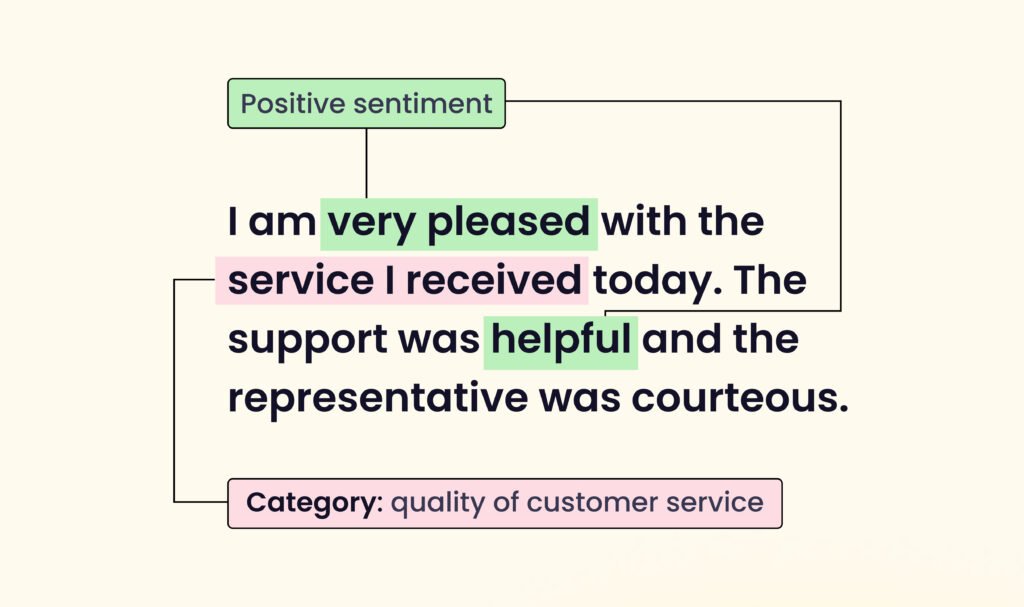
3. Write better responses more quickly
AI can also help you generate quicker responses to customers. You can add a few bullet points or a short paragraph for context and AI will generate a proper response for the customer that you can send. This cuts down the time taken to write long replies from scratch. This also ensures the answers written will align with the brand tone and remain consistent.
What’s more, you can make edits to the tone in which the response is written according to the sentiment behind the ticket and ensure the customer gets the best possible response. For instance, if the customer has had a negative experience and is frustrated, you’ll be more sympathetic in your response.
4. Improve the knowledge base experience
An AI-based help desk can also help you improve the content you have on your knowledge base. It can do this by analyzing incoming tickets to figure out which keywords are recurring with the most frequency and what exactly is causing most trouble to customers, amongst other things. Based on that, it will make recommendations to add new content to your knowledge base as well as update existing content so that customers can help themselves.
This will reduce the workload of agents as a lot of customers prefer trying self-service before reaching out to a human agent. And if they find a helpful article that solves their issue, they will no longer need to contact the support team.
Recommended Read: 10 Ways to Write Great Knowledge Base Articles
5. Summarize the content of support tickets
A lot of conversations between customers and agents get prolonged and there’s plenty of back and forth resulting in long conversation threads. Or maybe the customer has gone into a lot of detail in explaining their issue. In both cases, tools like AI paraphrasing can assist the agent by summarizing the content of the conversation into a short paragraph which will give all the necessary context to the agent. This ensures agents do not have to go all the way back to read through the entire conversation to get themselves up to speed with what needs to be done, thanks to an AI Summarizer.
Agents can save a lot of time and can get back to the customer much quicker. This also comes in handy during escalations or hand-offs where the person being looped in can be brought up to speed quickly.
6. Translate tickets and responses
Businesses that operate globally would have customers reaching out to them in their respective native languages. By using an AI help desk’s translation capabilities, you can solve this problem and communicate with your customers from across the world, seamlessly. Your agents can work on the ticket in a language they’re comfortable with and the customer can receive the response in a language of their choice.
This will allow you to offer more personalized experiences to your customers. With clearer communication, you’ll be able to resolve customer issues much quicker too.
A Quick Rundown of the 7 Best AI Help Desk in 2025
Here is a list of the 7 best AI help desk software available in 2025. A lot of these tools offer different AI features at different prices, so evaluate them from a value-for-money standpoint if you’re planning to invest in one.
| AI Helpdesk | Key Features | Starting Price | Free Trial |
|---|---|---|---|
| Hiver | – Intelligent email template suggestions – Summarize emails with AI – Closing non-actionable queries | $49/user/month | 7 days |
| Zoho Desk | – Sentiment analysis – Anomaly predictions | $40/user/month | 15 days |
| Help Scout | – AI summarize – AI assist | $40/user/month | 15 days |
| Zendesk | Zendesk basic AI: – Generative replies – Content cues Advanced AI: – Intelligent triage – Generative AI for help center | $55/user/month | 14 days |
| Front | – Compose with AI – Summarize with AI | $59/user/month | 7 days |
| Bold Desk | – AI-powered translate – Generative AI | $50/user/month | 15 days |
| Freshdesk | – Article suggester – Canned response suggester | $49/user/month (+$29 add-on) | 14 days |
1. Hiver
Hiver is a powerful help desk that works inside your inbox. This makes it very easy to set up and get started with because your agents won’t need to learn a new platform from scratch. Hiver is well-equipped with AI features to improve the productivity and efficiency of support teams. Hiver’s AI bot Harvey, can help you with the following:
- Intelligent email template suggestions: Email templates are a great way to quicken responses. But it can often be overwhelming to choose the most appropriate template in a particular context. Harvey eliminates this guesswork and identifies the best template choice for a response. You can also customize the suggested template to send tailor-made, personalized responses.

- Summarize emails with AI: You can summarize long back-and-forth email conversations between customer and agents into short, concise notes. This way agents don’t need to waste time going through the entire email thread to find out the context. This is particularly helpful during hand-offs or escalations as the other people looped in can quickly catch up.

- ‘Closing non-actionable queries: Often, after a support agent has resolved a query , the customer will send a ‘thank you’ message. This message does not require any further action but it reopens the conversation. Harvey identifies and closes these conversations. This ensures your team doesn’t waste time and effort manually closing these conversations. It also prevents your metrics from being skewed because of closed tickets being reopened unnecessarily.
Pricing:
Harvey Bot is available with Hiver’s Pro plan and beyond. The Pro plan is priced at $49 per user per month.
Free trial: 7 days
2. Zoho Desk
Zoho Desk is a cloud-based customer service platform that’s suitable for teams of all sizes. Zoho Desk’s AI-powered assistant, Zia, can perform a number of functions that make your support agents and processes more efficient. Some of them include –
- Sentiment analysis: Zia can scan the contents of any incoming customer query or response and judge the sentiment behind it. It categorizes the queries into positive, negative, or neutral tones and mentions the keywords that convey the tone. This allows agents to fine-tune their responses based on the customer’s mood as well as identify the causes of dissatisfaction.

- Anomaly predictions: Zia also analyzes and predicts anomalies in your help desk’s performance. For instance, if there’s an unexpected surge in incoming tickets, Zia will warn you so that you can get more hands on deck. Or if there’s a particular issue that is getting a lot of tickets, it’ll warn you about the same. You can then quickly act on it by updating your knowledge base with the solution for this issue.
Pricing:
Most of Zoho Desk and Zia’s AI capabilities are only available on their Enterprise plan which is priced at $40 per month per user.
Free trial: 15 days.
3. Help Scout
Help Scout is a customer service tool that helps businesses manage their support operations from a centralized platform. The tool has a user-friendly interface and comes equipped with a number of helpful features like customer query routing and prioritization, @mentions and private notes, live chat, and knowledge base.
Help Scout is also powered by a number of artificial intelligence (AI) features like:
- AI summarize: This feature helps customer service agents create a bullet point summary of long email threads. This way, agents don’t have to spend time combing through the entire thread looking for context.
- AI assist: AI assist helps your agents write more accurate responses to customers. You can do things like shorten your response or change the tone of the response you’ve written. You can simply select commands such as “Make it friendlier” or “make it professional”. This ensures that your agents maintain a consistent tone of voice that aligns with your brand and write helpful responses.
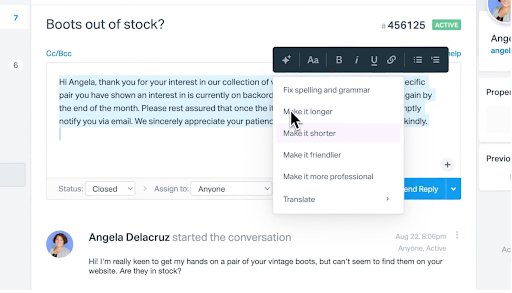
Pricing:
Help Scout’s AI-powered features are available to businesses subscribed to their Plus plans and beyond. The Plus plan is priced at $40 per user per month.
Free trial: 15 days.
4. Zendesk
Zendesk is a help desk platform that lets businesses offer customer support via voice, chat, email, messaging, social channels, and other touchpoints. The tool comes built-in with some basic AI functionalities for support teams. It also offers advanced AI features which can be purchased as a separate add-on.
Zendesk’s basic AI features include –
- Generative replies: This feature applies to businesses that have a help center/knowledge base. Essentially what happens is, the articles present in your knowledge base are evaluated by generative AI and using that information, responses are automatically created for your customers.
- Content cues: Content cues are suggestions on how to improve the health of your knowledge base i.e. how to make it more helpful for users. You get suggestions like which articles in your KB need to be improved because they’re underperforming or what are the most common questions from customers so that new articles can be created on them.
Zendesk’s Advanced AI features include –
- Intelligent triage: Intelligent triage is a feature that automatically detects the intent behind the ticket, the language it’s written in, and whether the tone of the message is positive or negative. This is useful in routing the tickets to the right teams as well as for creating reports on the trends in the types of tickets you’re receiving.
- Generative AI for help center: This feature lets you create help center content quickly and effectively. You can write short notes or bullet points and click on ‘expand’ and it writes a complete paragraph for you. Besides helping you write support content quickly, this functionality ensures that your help center content will also have a consistent brand voice.

Although Zendesk offers a lot of powerful functionality, the way their features are mapped to different pricing plans is very tricky. You’ll have a really hard time understanding what features you’re paying for.
Each of the AI features I mentioned above, the basic ones and the advanced ones, are mapped to different pricing plans. Let’s take the basic features I mentioned as an example –
The generative replies feature is available on all of Zendesk’s Suite plans but none of their Support plans.
But the content cues feature, also a basic AI feature of Zendesk, is only available on the Enterprise and Enterprise Plus plans.
Not to mention Zendesk is really pricey as compared to other similar solutions in the market.
Pricing:
Most of Zendesk’s basic AI features come with their Suite plans which start from $55 per month per user. And if you decide to purchase the Advanced AI feature add-on, you’ll pay an extra $50 per month per user on top of the base price.
Free trial: 14 days.
5. Front
Front is an AI-powered help desk that enables support teams to interact with customers across multiple channels, automate repetitive tasks, and get detailed insights on team performance and support quality.
Front’s AI capabilities include:
- Compose with AI: You can draft replies or new messages to customers based on ongoing conversation context or just by adding a few bullet points. You can also adjust the tone of the reply by selecting one from the dropdown menu, thereby enhancing the quality of the response. This feature can significantly reduce the response times of your agents.
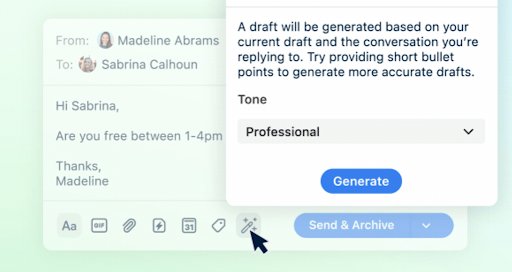
- Summarize with AI: Similar to Hver and Help Scout’s AI summarize, this feature saves your agents the hassle of going through the entire back and forth conversation thread. Instead, with a single click you can generate a short summary that gives you a snapshot of what’s being discussed. These AI-generated summaries include customer happiness scores and recommendations for the next steps.
Pricing:
Different AI features are included with different plans. For instance, you can get the ‘Summarize with AI’ feature on their Growth plans (priced at $59/user/month) and beyond. But you can only get the ‘Compose with AI’ feature on their Scale ($99/user/month) and Enterprise ($229/user/month) plans.
Free trial: 7 days
6. Bold Desk
Bold Desk is a simple, intuitive ticketing system that can help you manage and track customer support inquiries and requests. Bold Desk also utilizes AI-powered features to improve the support team’s performance and provide quick, effective customer support.
Bold Desk’s AI offerings include the following:
- AI-powered translate: When customers from different countries interact with you in their native language, it can be difficult to offer support unless you have agents fluent in those languages. But this feature solves the problem by letting agents translate content and respond to customer requests in their native language.
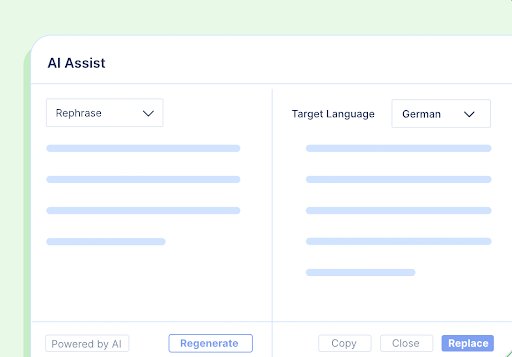
- Generative AI: Bold Desk also lets you generate different types of text to reply to customers. You can rephrase, elaborate, shorten, or proofread your written responses so as to make sure your customers are receiving better quality answers. This in turn will also help you reduce your resolution time for tickets and improve overall satisfaction.
Pricing:
AI features are available in the Growth plan and beyond for no extra cost for the time being. In the near future however, these will be made available as a separate add-on. The Growth plan is priced at $50 per month which includes 3 agents. Additional agents can be added at an extra cost.
Free trial: 15 days.
7. Freshdesk
Freshdesk is another popular customer service software that is ideal for small and medium-sized businesses. With Freshdesk, you can do everything from managing tickets to engaging with customers in real-time. Freddy, Freshdesk’s AI bot, can perform a number of tasks that makes life simpler for your agents. Some of its capabilities include:
- Article suggester: This feature scans the customer query coming in and suggests the most appropriate article to the customer from your knowledge base. Agents no longer have to manually search through your knowledge base to find answers to customer queries.
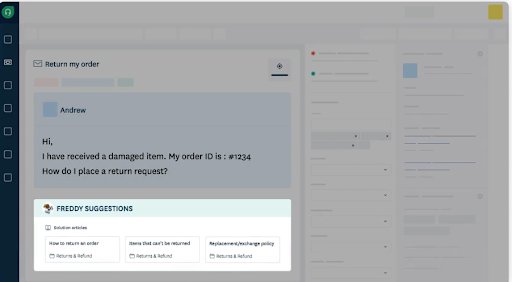
- Canned response suggester: When tickets come in, Freddy will automatically make canned response suggestions which can be used by agents to respond quickly to customers. . Agents won’t have to write long answers for each ticket from scratch or look through old emails to find a template with which to respond.
Pricing:
Features like article suggester and canned response suggester are part of Freddy Copilot which can be purchased as an add-on for $29 per agent, if you’re on Freshdesk’s Pro ($49/agent/month) or Enterprise ($69/agent/month) plans.
Free trial: 14 days.
The Bottom Line
Now you know all about the different ways in which AI can boost help desk productivity for your organization. If you haven’t already invested in an AI help desk or are looking to switch over to another tool, I’d suggest you take your time and check how the above 7 tools compare to each other in terms of:
- The AI features they’re offering
- The price point they’re offering it at
- And how well-equipped the help desk is aside from it’s AI offerings
We’re right in the middle of a revolution in customer support. If you want to stay on top, you must ensure you have a team that embraces AI and is equipped with the right set of tools like AI help desks that give you an edge.



































